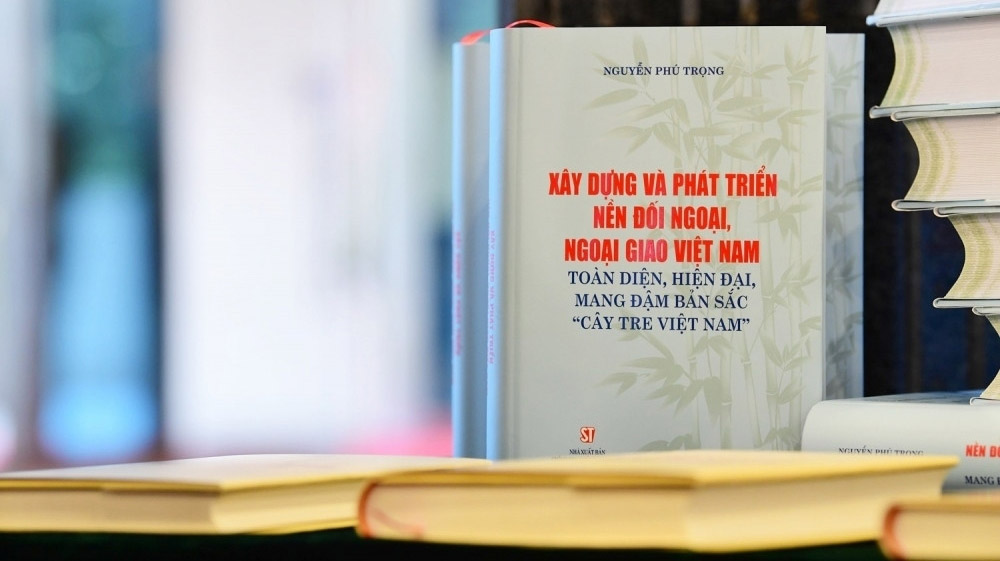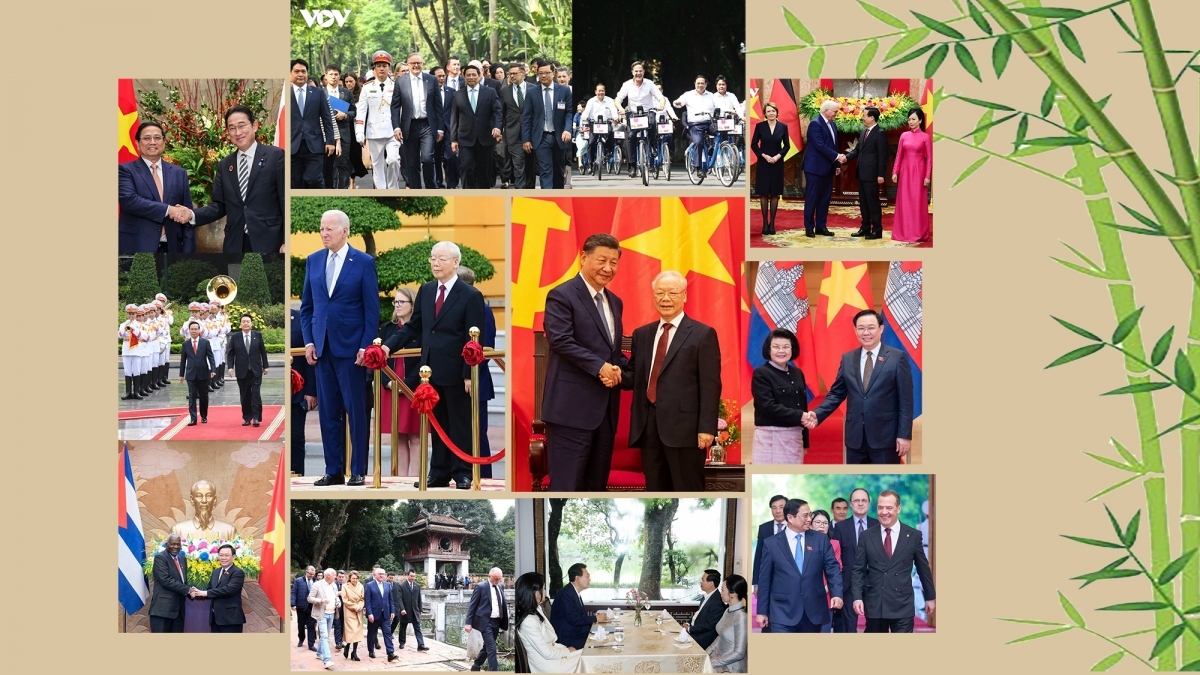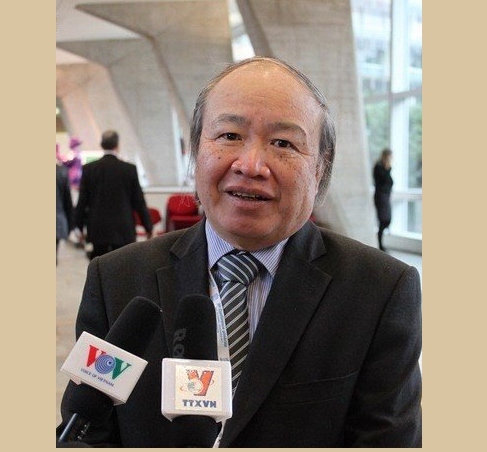
A book by Party General Secretary Nguyen Phu Trong on the building and development of Vietnamese diplomacy deeply imbued with the characteristics of “Vietnamese bamboo” was launched in November, 2023. This is Party leader Trong's first book on the topic of foreign affairs.
The 800-page book is divided into three parts, which were selected from 86 speeches, articles, interviews, letters, and messages of General Secretary Phu Trong on foreign affairs.
The first focuses on the important role of and major contributions made by diplomacy to national construction and defence efforts. It consists of an overview article and seven speeches the Party leader delivered at meetings of the Party Central Committee and national diplomatic and foreign affairs conferences.
The second part is on Vietnamese foreign affairs for independence, self-reliance, peace, friendship, co-operation, and development. It gathers together speeches, writings, interviews, letters, and messages of the General Secretary at bilateral and multilateral diplomatic activities and forums, showing the close and harmonious co-ordination among the diplomatic pillars of Party-to-Party, State-to-State, and people-to-people diplomacy.
The third part is about the hallmarks of the country’s foreign affairs and diplomacy. It features a total of 52 opinions of international experts, politicians, diplomats, researchers, and friends about General Secretary Trong’s role and contributions to the formation and development of Vietnamese comprehensive and modern foreign policy.
It also includes the memories, impressions, and stories shared by Vietnamese diplomats, journalists, and expatriates who used to accompany or meet the leader during his visits and working trips both in the country and abroad, reflecting their sentiment towards, respect for, and trust in the Party and the General Secretary’s leadership.
Regarding Vietnamese diplomacy, General Secretary Trong said, "We have built a very special and unique school of foreign affairs and diplomacy of the Ho Chi Minh Era, imbued with the identity of Vietnamese bamboo"
Talking to VOV, Ambassador Associate Professor-Dr. Duong Van Quang, former director of the Diplomatic Academy of Vietnam, emphasized that the outstanding characteristics of bamboo are flexible, rich in vitality, and easy to adapt to the environment.

Each bamboo bush indicates the image of growth, with a solid base, and flexible branches which are very resilient in the face of storms and harsh weather. The image of bamboo therefore serves as the embodiment of the Vietnamese nation.
According to Associate Professor-Dr. Quang, in international relations, since the birth of modern diplomacy, the function of diplomacy is to both prevent and end war. Therefore, it is said that diplomacy takes the lead and plays a pioneering role in this.
When the nation carries out its foreign policy, "bamboo" diplomacy can be understood as always having to flexibly adapt to the situation.
Being both immutable and unchangeable is the principle because diplomacy is a need and an art. Therefore, each person and each time will have different ways of negotiating and determining outcomes.
Diplomacy requires different ways of negotiating and determining, with the most important thing being protecting national interests.
However, in diplomacy it is necessary to pay attention to both the interests of partners and the common interests of the world in order to ensure that diplomacy can be sustainable and effective, the diplomat continued.
“In the period of international integration, there are three parts in national interests First is the benefit of our own country. Every country has their own national interests. Second is the national interests of other countries.
And when determining national interests like that, people also determine the principle of action is not to overcome, not to sacrifice. But the current period of international integration also has a very important part, which is the common interests of humanity.
However, the common interests of humanity are currently urgently posed. For example, issues relating to climate change, peace maintaining, war and epidemic prevention, and transnational crime require all countries in the world to join hands in dealing with as it is in the common interest of humanity,” Quang stressed.
Diplomacy must take the lead in the national protection strategy. In order for diplomacy to be able to be carry out the task of protecting the nation and to prevent risks of war, one of the key factors is aligning our interests with those of the international community.
To do this, Associate Professor-Dr. Quang underlined the need to study international relations to see global trends.

“For example, in the issue of combating climate change, where are our national interests? Vietnam is among the most vulnerable countries when sea levels rise. We cannot do it alone, so we must join hands with the world. Therefore, the role of a country, the position of a country, also known as its positioning on the world map, is its contribution to the common interests. So if we forget this, we will be lost and become selfish in international relations,” he explained.
Associate Professor-Dr. Quang reiterated that national interests are paramount, with territorial sovereignty being sacred. However, sovereignty and territory protection in this period is different from the previous one.
The pioneering role in protecting the fatherland from afar and early is very important. Another point is that in terms of international relations, there are always frictions and disputes, although those problems must be resolved by peaceful means. That is the principle of conduct in international relations, he stressed.
There are opinions and views saying that, according to bamboo diplomacy, Vietnam will always stand in the middle and be neutral in all international issues, thus being isolated in the international community. Discussing this, the diplomat said, “The nature of bamboo diplomacy is not neutral, but dynamic. That dynamic is based on national interests. Dynamic based on common sense and dynamic based on international law. So how to create it, to be aware of such a problem, is important.”
The trend of the current era is that each country must contribute to the world and to humanity. Previously in international relations, we were a poor country so we needed help. But now it's time for us to help others. From a dynamic diplomatic perspective, this must be understood in its true meaning. How to harmonize interests, how to contribute to the world, so we will never be isolated.
Diplomacy in the reform period is therefore a very dynamic thing that aligns the times and current trends, he concluded.
VOV





